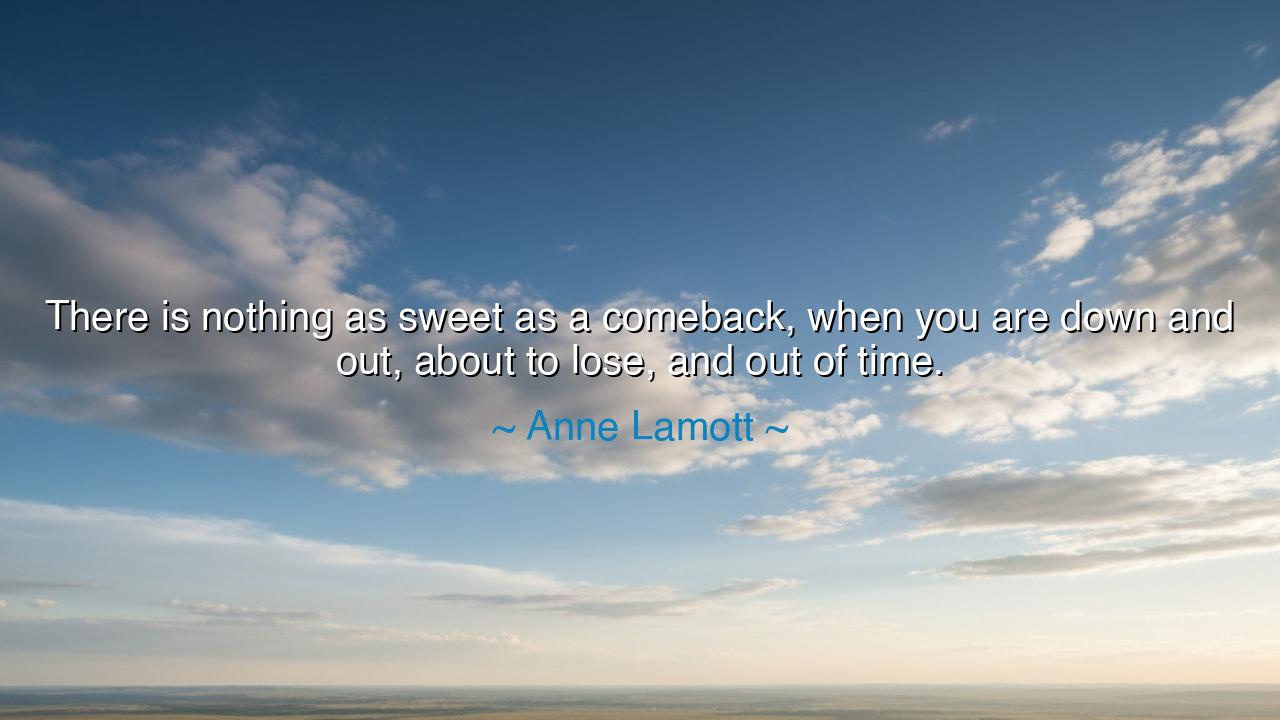
There is nothing as sweet as a comeback, when you are down and
There is nothing as sweet as a comeback, when you are down and out, about to lose, and out of time.






Hear the words of Anne Lamott, filled with fire and truth: “There is nothing as sweet as a comeback, when you are down and out, about to lose, and out of time.” These words capture the very heartbeat of human resilience, the triumph of spirit when all hope seems lost. For in the darkest moment, when defeat appears certain, and the last grain of sand is falling through the glass, the sudden surge of strength—the reversal, the rising again—is sweeter than any easy victory.
The ancients knew this feeling well. Did not the poet speak of warriors who stood their ground when surrounded, and whose victories, snatched from the jaws of despair, rang louder than the triumphs of armies that marched unchallenged? For the comeback is not merely the winning of a contest, but the redemption of the soul—the moment when a man or woman proves to themselves, and to the world, that they are more than their weakness, more than their failure, more than the fate that threatened to bury them.
Consider the tale of Nelson Mandela. For twenty-seven long years, he languished in prison, silenced, shackled, and written off by many as a man forgotten by history. Yet when he emerged, he did not emerge broken. He led his nation from the ashes of oppression into reconciliation and freedom. His rise was the sweetest comeback, for it came when all seemed lost—when the night was deepest, he became the dawn. His story is proof of Lamott’s wisdom: the greatest victories are born in the shadow of certain defeat.
So too in the world of sport, we find the same eternal truth. Recall Muhammad Ali, stripped of his title, banned from the ring for refusing to betray his conscience. The world thought him finished. Yet he returned, older and slower, but with a spirit unbroken. Against George Foreman, the younger and stronger champion, Ali endured punishment, waiting, biding, until at last he struck with fury. The world roared, for this was more than boxing—it was the comeback of a soul who refused to surrender.
But hear this warning, O seekers of glory: the comeback is not given freely. It is purchased with suffering, with patience, with courage that does not falter even when the light seems gone. Many fall and do not rise, for they yield to despair. Only those who continue to fight, who hold faith even when the hour is darkest, will taste the sweetness Lamott describes. For it is not the fall that defines a life, but the rising after the fall.
The lesson is plain: do not fear being down and out. Do not despise the moments when you are about to lose, when the clock is against you. These are the proving grounds of greatness. When life drives you to the edge, hold fast, endure, and rise again. For in that rising, your story becomes more than survival—it becomes inspiration, a beacon to others who struggle in their own darkness.
Practical wisdom lies before you: when you fail, do not end the story there. Begin again. When others doubt you, let their doubt be the fuel for your perseverance. Train your mind and heart to see adversity not as final defeat, but as the forge of your comeback. Each setback is preparation, each hardship is a teacher, each delay is the building of strength unseen. And when the hour comes, when you seize victory out of certain defeat, it will be sweeter than all the triumphs of the untested.
Therefore, let Lamott’s words echo in your heart: “There is nothing as sweet as a comeback.” Do not seek an easy path, for easy paths bear little glory. Seek instead the courage to endure, the faith to rise, and the fire to fight on when all seems lost. For it is in the final moments, when you are pressed to the ground and time runs out, that the greatest victories are born—and their sweetness will echo through eternity.






AAdministratorAdministrator
Welcome, honored guests. Please leave a comment, we will respond soon